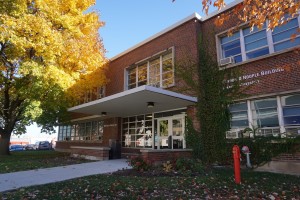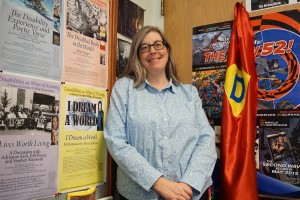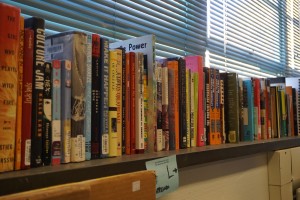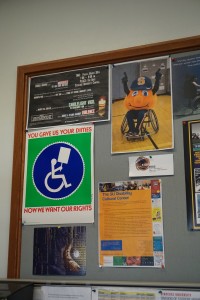この記事は次の言語でも読めます:日本語
Wonderful People No.1 :
Dr. Diane R. Wiener, Director of the Disability Cultural Center at Syracuse University

At Syracuse University, there is a place called the Disability Cultural Center (DCC) which organizes various events, seminars, and workshops on and off campus to raise awareness about People with Disabilities and disability cultures.
Usually, universities in the States have offices for arranging reasonable accommodations for the students, faculty, and staff with disabilities.
However, there are only three universities in the U.S. that also have disability-focused cultural centers, and only two of these are completely distinct from the campuses’ disability services offices.
Syracuse University’s DCC is one of these two national centers; it is the only one that has a full-time, professional director.
I had the opportunity to interview the director, Diane Wiener.

Early in her career, Diane worked in the mental health field, and became more and more interested in and disturbed by the ways that people’s rights were not always being honored.
She went back to school to get a doctorate and became very connected with disability studies.
While researching the field, she thought about interdisciplinary connections between social work, mental health rights, clients being exploited, all kinds of things.
Also, she understood that class, race, sexuality, gender and identity are connected with disabilities.
After being a faculty member at Binghamton University, she got the opportunity to work in Syracuse, which has a longstanding history related to the disability rights movement.
For example,
・Syracuse University was one of the first universities to establish a real commitment to deinstitutionalization.
・Steven J. Taylor created a Disability Studies program which was the first one to exist in the United States.
・Syracuse was one of the first cities to really respond critically to the ways that people were being locked up in developmental centers.
・The “Label Jars, Not People” campaign was started in Syracuse by the Human Policy Press, in the Center on Human Policy.
・The “Nothing about Us Without Us” concept remains very alive in Syracuse.
・There continues to be work around supporting the rights of people with intellectual disabilities and people who have been psychiatrically incarcerated.

At Syracuse University, there are four cultural centers: the Office of Multicultural Affairs, the LGBT Resource Center, the Slutzker Center for International Services, and the Disability Cultural Center (as well as Hendricks Chapel).
These are all about a commitment to diversity and inclusion across and beyond the campus community.
Diane is involved with helping to make events, classes, curricula, and environments more inclusive on the campus.
She also speaks at conferences; consults with different programs around the world; and advises schools and organizations, locally, regionally, and nationally.
To raise awareness about People with Disabilities, Diane spends a lot of time talking with people about the intersections and politics of disability identities.

In the U.S., we have many opportunities and exciting things.
People with Disabilities, however, have an incredibly high unemployment rate.
I think that People with Disabilities need always to be included in all spaces that involve work about people with disabilities, which is connected with the idea of ‘Nothing About Us Without Us’ (a slogan that came into use in disability activism during the 1990s).
But, also, People with Disabilities need to be included in spaces everywhere.
This has to happen whether or not it’s about the topic of disability.
I shouldn’t have to only think that People with Disabilities are working in areas having to do with disability, because, frankly, everything has to do with disability, anyway.
People with Disabilities ought to be welcomed and understood and imagined as being present in every arena of life (because we are).
We need to do more to be sure that People with Disabilities are part of every conversation, and not excluded, and we as People with Disabilities need to be sure, too, that we are part of the decisions that are made about representations and about choices, legislation — everything.
My ideal world for People with Disabilities would be that our disabilities would not be perceived as disabilities, unless we *chose* to perceive them as disabilities, because they’re part of who we are.
And, a part of a sense of pride.
The interactions with the environment would be so seamless and the interactions with other people would be so beautiful that the disabilities wouldn’t be an issue.
It would be a world of disabilities without disabilities, because people would still have disabilities, but the environment would not be disabling and the interactions with other people wouldn’t be disabling.
We would just all make connections with one another in an egalitarian, respectful, loving way.
We want to do more than have inclusion.
We want to do more than have compliance.
If you go beyond compliance, you are more likely to have a feeling of belonging.
I really want everyone to know that “inclusion isn’t enough”.
